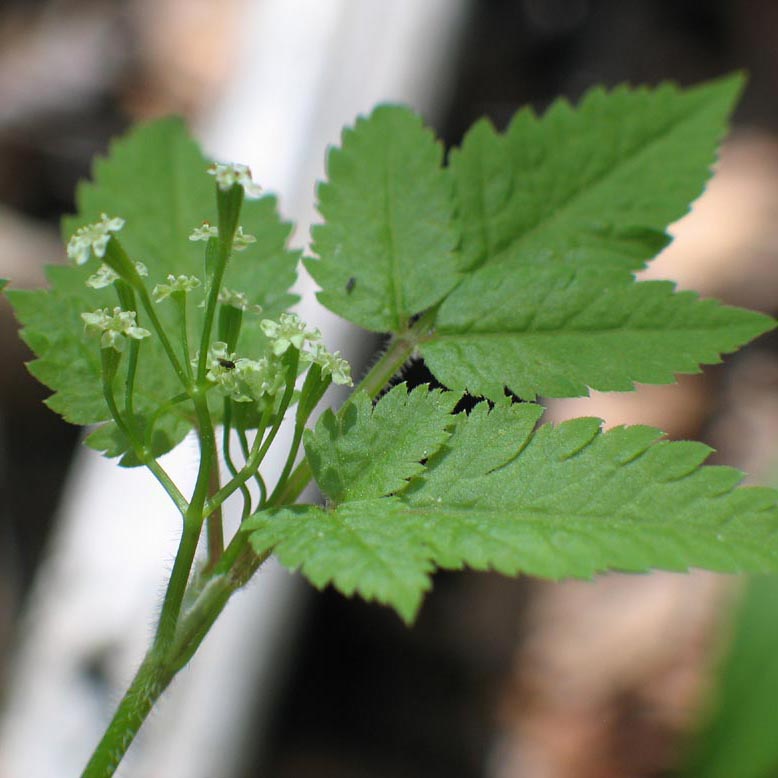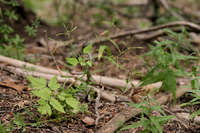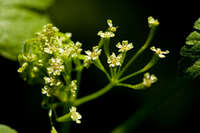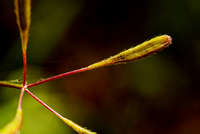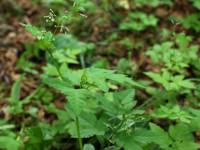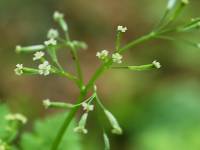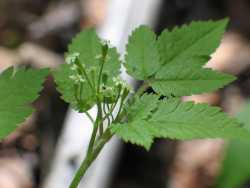General: Perennial, 15-100 cm tall; stems solitary or 2-3, occasionally with a pubescent ring at the nodes; taproot well developed.
Leaves: Basal and cauline (1-3), alternate, compound, 2-11 cm long, 1.5-5 cm wide, twice ternate (or upper cauline leaflets once-ternate); leaflets usually 9, ovate to elliptic, 1-3 cm long, margins toothed, lobed to cleft; basal blades with petioles 3-17 cm long, cauline blades nearly sessile.
Flowers: Inflorescence a terminal compound umbel arising from a peduncle 4-30 cm long, pubescent, with 2-20 sometimes unequal rays, each 0.2-7 cm long; pedicels 2-12 mm long, subtended by linear bractlets 2-6 mm long; petals yellow, tinged with purple; anthers yellow; styles 1.5-2 mm long; flowers March-June.
Fruits: Schizocarp, narrowly club-shaped, 10-18 mm long, beak convex-obtuse.
Ecology: Forests, streamsides, often in spruce-fir and aspen forests; 1800-3200 m (5900-10500 ft); Apache, Coconino, Gila, Graham, Greenlee, and Pima counties; north-central, northwestern to southwestern U.S.
Notes: Osmorhiza berteroi (sweetcicely) [=O. chilensis] shares numerous characteristics with O. depauperata, but these two species are distinguished primarily by morphological characters of the fruit. Osmorhiza berteroi has linear- oblong, cylindric fruits that are narrowed toward the apex. It occurs in Coconino, Gila, and Yavapai counties at 1800-2200 m (6000-7000 ft). Osmorhiza depauperata may be propagated by direct seeding or by planting plugs, and is intolerant of fire.
Editor: Springer et al. 2008
Much like no. 4 [Osmorhiza berterii DC.]; pedicels and rays more widely spreading and stiffly divaricate; fr mostly 10-15 mm, convexly narrowed to the rounded or obtuse to merely acutish summit, the tip not beak-like; stylopodium low-conic to depressed, as wide as or oftener wider than high; 2n=22. Moist woods; Nf. and e. Que. to n. Vt.; Lake Superior reg. of n. Mich., ne. Minn., and s. Ont.; widespread in the w. cordillera; Chile and Argentina. (O. obtusa)
Gleason, Henry A. & Cronquist, Arthur J. 1991. Manual of vascular plants of northeastern United States and adjacent Canada. lxxv + 910 pp.
©The New York Botanical Garden. All rights reserved. Used by permission.


